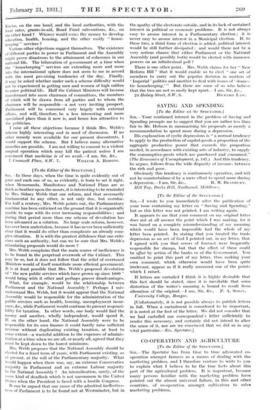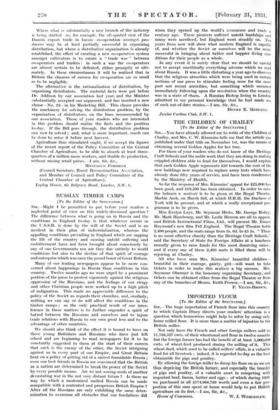CO-OPERATION AND AGRICULTURE [To the Editor of the SPECTATOR.] Sin,—The
Spectator has from time to time advocated co- operation amongst farmers as a means of dealing with the marketing problem, and I therefore venture to write to you to explain what I believe to be the true facts about this part of the agricultural problem. It is important, because many persons familiar with the marketing problem have pointed out the almost universal failure, in this and other countries, of co-operation amongst cultivators to solve marketing problems.
Where what is substantially a new branch of the industry is being started-- as, for example, the oft-quoted case of the Danish export trade in bacon—co-operation amongst pro- ducers may be at least partially successful in organizing distribution, but where a distributive organization is already established, the effect of creating a new co-operative system amongst cultivators is to create a " trade war " between co-operators and traders : in such a war the co-operators are almost certain to be defeated, either promptly or ulti- mately. In these circumstances it will be realized that in Britain the chances of success for co-operation are so small as to be negligible.
The alternative is the rationalization of distribution, by organizing distributors. The material facts were put before Dr. Addison by our association last year, and the Minister substantially accepted our argument, and has inserted a new clause—No. 13—in his Marketing Bill. This clause provides the machinery for solving the distribution problem, by the organization of distributors, on the lines recommended by our association. Those of your readers who are interested in this problem should realize the facts and the position to-day. If the Bill goes through, the distribution problem can now be solved ; and, what is more important, much can be done to solve it before next harvest.
Agriculture thus stimulated ought, if we accept the figures of the recent report of the Policy Committee of the Central Chamber of Agriculture, to be able to absorb at least three- quarters of a million more workers, and double its production, without raising retail prices.—I am, Sir, &c.,
MONTAGUE FORDHAM
(Council Secretary, Rural Reconstruction Assxsiation, and Member of Council and Policy Committee of the Central Chamber of Agriculture).
Leplay House, 65 Belgrare Road, London, S.W. 1.












































 Previous page
Previous page